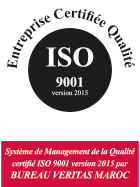The Morocco is entering a new phase in its strategy of energy and water autonomy. Three memorandums of understanding have just been signed between the National Electricity and Drinking Water Office (ONEE) and a Moroccan-Emirati consortium comprising Taqa Morocco, Nareva, and the Mohammed VI fund for Investment. This partnership gives rise to a vast integrated infrastructure program, mobilizing nearly 130 billion dirhams (USD 13 billion) by 2030.

Driven by the imperatives of energy transition, water security, and regional planning, the operation follows on from the December 4, 2023 joint declaration between Morocco and the United Arab Emirates, which called for a strategic industrial partnership based on technological synergies.
The water component is structured around two transformational projects. Firstly, the construction of a water transfer system between the Oued Sebou and Oued Oum Rabia basins, with a capacity of 800 million cubic meters per year. Secondly, the installation of desalination plants powered exclusively by renewable energies, with a total annual capacity of 900 million cubic meters. The target tariff, set at 4.5 dirhams (USD 0.5) excl. tax/ cubic meter,, remains in line with the reference prices agreed for desalination projects already underway. This reinforces the sustainability of the model.
On the energy front, the program calls for the construction of a 1,400-kilometer high-voltage direct current (HVDC) power line, designed to carry up to 3,000 MW between the country’s southern and central regions. This strategic infrastructure will facilitate the integration of renewable capacities installed in the southern provinces. The line will be operated by ONEE. At the same time, a further 1,200 MW of renewable energies will be deployed, while a new natural gas-fired combined cycle, planned for Tahaddart, will eventually generate 1,500 MW.
All these projects will be equally owned by TaqaMorocco and Nareva, with a 15% contribution from the Mohammed VI Fund for Investment and other public players. This configuration combines industrial expertise, mastery of value chains and a long-term vision.

Nareva, a coherent presence
As an integrated player in the country’s energy sovereignty, Nareva currently covers more than 20% of the country’s electricity production. A leader in wind power on the African continent, the company is deploying a coherent network linking production, transmission, and water management, with iconic projects in the cities of Dakhla, Tarfaya, and Boujdour. Nareva is also developing desalination infrastructure and strategic water transfer systems, while consolidating high-voltage lines. TAQA Morocco, for its part, plays a central role in conventional and low-carbon power generation. A subsidiary of the UAE-based TAQA Group and listed on the Casablanca Stock Exchange, it is a key player in the Kingdom’s low-carbon strategy, while also contributing to long-term energy security.
Beyond the technical aspects, the socio-economic benefits are substantial. The program is expected to create more than 25,000 jobs, including 10,000 permanent positions after commissioning. The program will also encourage the development of local industries in the desalination, renewable energies, and high-voltage sectors, while supporting training and skills transfer schemes.
Governance and regulatory framework
Implementation of the program is based on a series of development agreements between ONEE and the consortium. The first, for the Tahaddart combined-cycle power plants, has already been signed. The financing of the various projects will be structured by the operators, who will seek national and international funding. The entire project is subject to compliance with regulatory procedures, particularly with regard to merger control.
By 2030, this strategic pact could well redefine Morocco’s energy and water landscape. It combines climate imperatives, industrial logic, and sovereignty ambitions. Through it, the Kingdom is betting on an integrated, resilient and regionally-oriented model to lay the foundations for sustainable development.
Khadija MASMOUDI


























